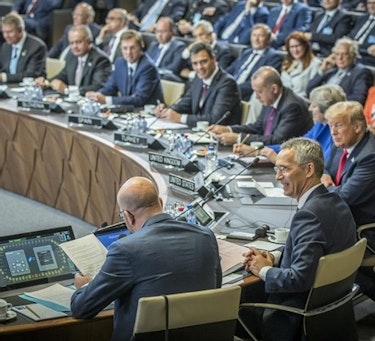The Future of Transatlantic Relations

Secretary General of NATO, Jens Stoltenberg, leading a session during the NATO Summit in Brussels in July 2018
Foto: NATOIn this Weekly analysis, professor Magnus Petersson, Head of Centre for Transatlantic Studies and Centre for Asian Security Studies at the Norwegian Institute for Defence Studies, writes about the various and multiple challenges to NATO and transatlantic security.
The Norwegian Atlantic Committee frequently presents a time-relevant analysis, handpicked by one of the Committee's partners, employees or others. If you want to write the next 'Weekly analysis', contact andreas@dnak.org. The content of the analysis does not necessarily represent the official view of the Norwegian Atlantic Committee.
The rules-based, liberal-democratic international order, as we know it since the end of the Second World War, is under severe pressure, which has serious, negative implications for European, transatlantic, and global security. NATO, the world’s most important defender of Western civilization, is challenged from a revisionist Russia, from a nationalist United States, and from a Europe in financial and political crisis.
Revisionist Russia under President Vladimir Putin pose an external challenge to the alliance, claiming a “sphere of influence”, expanding its territorial boundaries, undermining institutions, elections, and suppressing liberal values, human rights, and the rule of law. The nationalist US administration under President Donald Trump highlights “competition” rather than “cooperation”; repetedly humiliating its liberal-democratic NATO allies and praising authoritarian regimes such as Saudi Arabia. In addition, the US is retreating from its historical role as an anchor of the Western liberal order. Finally, Europe is struggling with internal problems, economic as well as political and military. Traditional geopolitics, and authoritarian regimes, is making a comeback, deeply affecting European and transatlantic security.
At the NATO Summit in Brussels in June, 2018, the different world views between the US administration and many European governments was demonstrated once again, especially regarding trade and defence spending. After the NATO Summit Trump went to Helsinki to meet with Putin, a meeting that Trump described as a “great success” in a tweet.
In addition, NATO’s strongest military power in the South, Turkey, has under President Recep Tayyip Erdogan gradually moved away from the West, and become more and more authoritarian. It has also increased its political and military cooperation with revisionist Iran and Russia, two of the Wests main challengers. After the failed coup in 2016, these tendencies have intensified, which has become a major problem for NATO.
Can NATO and the transatlantic security community survive these multiple challenges, or will the challenges lead to a renationalization of security and defence in the North Atlantic area?
As many experts have claimed, NATO is a highly resilient, adaptive and enduring military and political alliance. And as Wallace Thies points out, NATO’s relevance and ability to survive has been challenged many times before, and it has often been described as an organization in more or less “permanent crisis”. What makes NATO different than previous alliances is that the members of the alliance are sharing not only interests, but values as well, codified in the preamble of the North Atlantic Treaty as allied support for democracy, individual liberty, and the rule of law.
Furthermore, as Karl Deutsch and his colleagues showed already in the 1950s in their famous work on the North Atlantic area as a security community, the structural Western integration has gone so far that it is hard to imagine a rapid disintegration. The factors that Deutsch and his colleagues analyzed were, for example, compatibility on major values, sense of community, distinctive way of life, high living standard, wide range of cultural exchange, and strong economic ties. Although there are signs of Europe and North America drifting apart, there are more signs of continuity than change. It takes time to build a security community, but it also takes time to destroy it.
However, it is of great importance to focus on the problems in the transatlantic relations, and to constantly work for its improvement. That must be done through more cooperation and not less. And most important of all, is to internally and externally promote and defend liberal-democratic values and norms, because they are the foundation of Western civilization, and of NATO itself.
Further reading:
Deutsch, Karl Wolfgang, Political Community and the North American Area. Princeton University Press, 2015.
Petersson, Magnus, NATO and the Crisis in the International Order. Routledge, 2018.
Thies, Wallace J., Why NATO Endures. Cambridge University Press, 2012.
Magnus Petersson is professor and Head of Centre for Transatlantic Studies and Centre for Asian Security Studies at the Norwegian Institute for Defence Studies. His main fields of interest include defence and security policy, military theory and NATO.